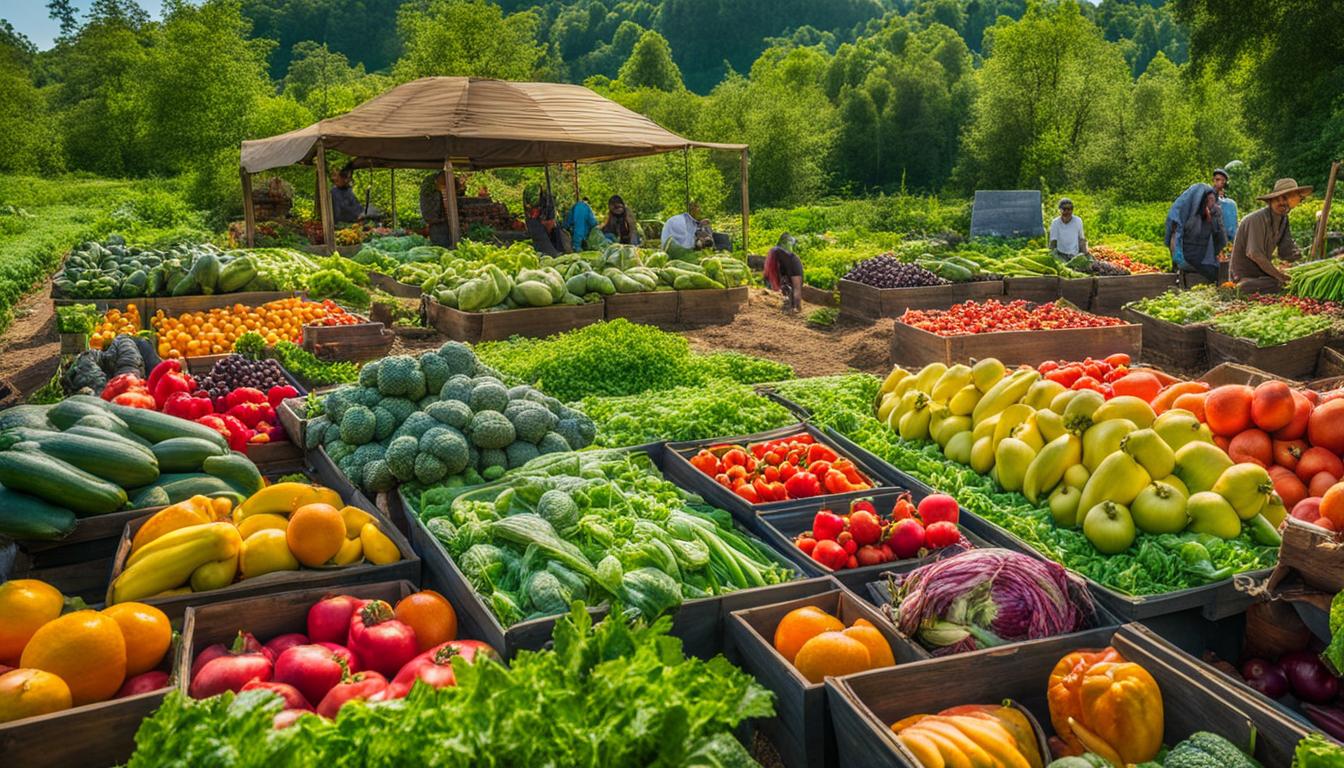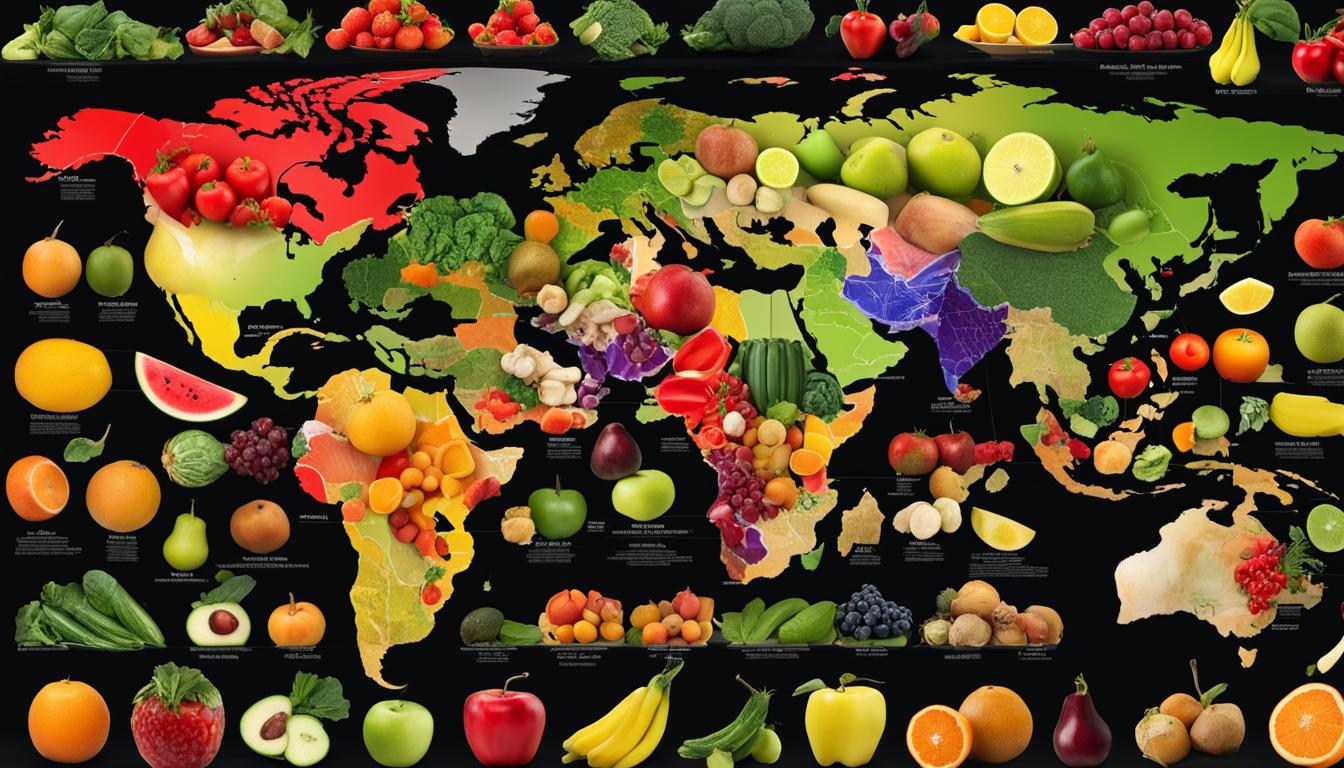When it comes to the food we consume, there is more to consider than just taste and convenience. Ethical eating is a concept that recognizes the impact of our food choices on the economy, society, and the environment. By understanding where our food comes from and embracing sustainable practices, we can become conscious consumers and make a positive difference.
Key Takeaways:
- Ethical eating involves considering the economic, social, and environmental impacts of our food choices.
- Understanding food sources is essential for making sustainable and ethical food decisions.
- Conscious consumerism plays a crucial role in promoting ethical eating practices.
- By embracing sustainable food practices, we can contribute to a healthier future for ourselves and the planet.
- Ethical eating is not just a trend, but a holistic approach to creating sustainable lifestyles.
The Role of Ethics in the Food and Agriculture Industry and Consumer Choices
Ethics plays a significant role in both the food and agriculture industry and consumer choices. As the demand for ethical food grows, consumers are becoming more conscious of the impact their dining choices have on the environment, animal welfare, and social justice. They want to support ethical agriculture practices and make choices that align with their values.
Within the food and agriculture industry, there have been notable improvements in areas such as animal welfare, social justice, and environmental stewardship. However, there is still progress to be made. By working together, industry stakeholders and consumers can contribute to a more sustainable and ethical supply chain.
Consumers have the power to drive change through their purchasing decisions. They can choose to support ethical dining establishments that prioritize sustainable sourcing and fair labor practices. By demanding transparency and accountability from the food industry, consumers can encourage businesses to adopt ethical practices and become more socially and environmentally responsible.

Empowering consumers through knowledge and choice
One important aspect of ethical food choices is being informed about where our food comes from and how it is produced. This empowers consumers to make choices that align with their values. Whether it’s knowing about the labor practices in the cocoa industry or the environmental impact of palm oil production, understanding the ethical implications of our food choices is crucial in making informed decisions.
Collaboration for a better future
By recognizing the role of ethics in the food and agriculture industry, we can work collectively to create a better future. Businesses, consumers, and government entities all have a part to play in promoting ethical practices. Through collaboration, we can foster a more sustainable and ethical food system that prioritizes the well-being of animals, the environment, and all those involved in the production and consumption of food.
Social Justice in the Food Supply Chain
Social justice is a critical aspect of ethical eating. It involves protecting and supporting workers’ rights, ensuring fair labor practices, and promoting equal opportunities. Unfortunately, many imported foods come from regions where labor standards and enforcement may be less robust, leading to challenges such as forced labor, child labor, violence, and extortion.
When it comes to the food supply chain, it is essential to consider the ethical implications of our choices. By understanding the labor practices involved in producing the foods we consume, we can make informed decisions that align with our values. This means supporting companies that prioritize fair wages, safe working conditions, and the empowerment of workers.
Policy reform is also crucial to address the social justice issues in the food supply chain. Governments and regulatory bodies play a significant role in setting and enforcing standards that protect workers’ rights. It is important for policymakers to prioritize labor rights and work towards creating a more equitable and sustainable food system.
The complexities of labor practices in the food supply chain
The food supply chain is complex, with multiple stakeholders involved in its production and distribution. From farm workers to processors, distributors, and retailers, each step of the process can have implications for social justice. Exploitative labor practices not only harm workers but also perpetuate inequalities and contribute to broader social issues.
Consumers have the power to drive change through their purchasing decisions. By supporting companies that prioritize social justice and fair labor practices, we can create demand for ethical products and influence the industry as a whole. Additionally, staying informed and advocating for policies that protect workers’ rights can contribute to long-term change in the food supply chain.

Why policy reform is necessary
Policy reform is necessary to address the social justice issues prevalent in the food supply chain. Governments should prioritize labor rights and work towards creating a more equitable and sustainable system. This can be achieved by implementing and enforcing robust labor laws, supporting fair trade practices, and promoting transparency and accountability throughout the supply chain.
- Improved monitoring and enforcement of labor standards
- Support for workers’ rights organizations and initiatives
- Collaboration with international organizations to address global labor issues
- Development of ethical sourcing guidelines for businesses
By taking a comprehensive approach that addresses social justice issues, we can create a food supply chain that is fair, ethical, and just for all those involved.
Animal Welfare in Food Production
The humane treatment of animals is a crucial aspect of ethical eating. It is our responsibility to ensure that animals raised for food are treated with compassion and respect. Various stakeholders, such as government entities, certifying bodies, and special interest groups, have developed standards and guidelines to promote the welfare of animals in the food supply chain.
One well-known framework for animal welfare is the Five Freedoms, which includes freedom from hunger and thirst, freedom from discomfort, freedom from pain, injury or disease, freedom to express normal behavior, and freedom from fear and distress. Adhering to these principles helps to ensure that animals are raised and handled in a manner that minimizes their stress and suffering.
Additionally, the use of antibiotics in animal agriculture is a significant concern. It is important to consider the impact of antibiotic use on both animal welfare and human health. Excessive use of antibiotics can contribute to the development of antibiotic-resistant bacteria, posing a risk to animal and human populations. Responsible antibiotic stewardship in animal agriculture is essential to protect the welfare of animals and safeguard public health.
Environmental Stewardship and Ethical Eating
When it comes to ethical eating, environmental stewardship plays a vital role in ensuring a sustainable future. Climate change and deforestation are two critical issues that have significant implications for our planet. It’s important to understand the environmental impact of our food choices and make informed decisions to mitigate these challenges.
One area of concern is the production of palm oil, which is widely used in various food products and has been linked to deforestation. The clearing of tropical forests for palm oil plantations contributes to habitat destruction, loss of biodiversity, and increased carbon emissions. By supporting brands that practice responsible sourcing and avoid deforestation, we can contribute to the protection of our environment.
Quotes:
“Environmental stewardship is not just about protecting our planet’s ecosystems; it’s about recognizing that our food choices have far-reaching consequences,” says environmental activist Jane Smith. “By adopting ethical eating practices, we can ensure that our planet is preserved for future generations.”
Another aspect of environmental stewardship is reducing food waste. Food production consumes valuable natural resources such as water, land, and energy. By minimizing food waste at both the consumer and industrial levels, we can reduce the overall environmental impact of our food system.
It is crucial to support sustainable farming practices that prioritize soil health, water conservation, and biodiversity. By choosing organic produce and supporting local farmers who follow sustainable agriculture methods, we can contribute to a healthier environment and promote ethical eating.

Together, through conscious choices and a commitment to environmental stewardship, we can make a significant impact on mitigating climate change, reducing deforestation, and promoting a more sustainable food system.
Individual Responsibility in Ethical Eating
When it comes to ethical eating, each individual has an important role to play in making a positive impact on the food system. Our everyday food decisions have far-reaching consequences that extend beyond our plates. By becoming conscious consumers, we can contribute to a more sustainable and ethical food supply chain.
Conscious consumerism involves being mindful of the choices we make regarding the food we buy and consume. It means considering the economic, social, and environmental implications of our food choices. By supporting local farmers and sustainable food practices, we can reduce our carbon footprint, promote biodiversity, and contribute to the well-being of communities.
One way to exercise individual responsibility is by supporting farmers’ markets and local food initiatives. This not only connects us with the source of our food but also helps to build resilient local food systems. By buying directly from farmers, we can ensure fair prices for their products and support practices that prioritize environmental stewardship and animal welfare.
Additionally, educating ourselves about the various certifications and labels used in the food industry can empower us to make informed choices. Labels such as “organic,” “fair trade,” and “cage-free” provide valuable information about the production methods and ethical practices behind the food we buy. By understanding and seeking out these labels, we can align our values with our purchasing decisions, supporting companies that prioritize sustainability and ethical standards.
The Power of Individual Food Decisions
- Support local farmers and sustainable food practices
- Choose products with certifications and labels indicating ethical practices
- Reduce environmental impact by eating plant-based meals
- Minimize food waste through mindful meal planning and proper storage
Ultimately, the power to create change lies with each of us. By making conscious food choices, we can drive demand for more ethical and sustainable practices in the food industry. Small steps, such as reducing meat consumption, opting for organic produce, and supporting fair trade, can collectively make a significant impact on building a more equitable and sustainable food system. Let’s embrace our individual responsibility and become catalysts for positive change through our food choices.

Business Practices and Ethical Sourcing
Businesses play a vital role in promoting ethical eating and ensuring the integrity of food products. Finding ethical food brands that prioritize transparency in their supply chain is essential for consumers who want to make conscious and responsible choices.
One way businesses can prioritize ethical sourcing is by partnering with suppliers who adhere to strict standards for social justice, animal welfare, and environmental stewardship. By working closely with their suppliers and conducting regular audits, businesses can ensure that their sourcing practices align with their ethical values.
Transparency in the Supply Chain
Transparency is key in building trust between businesses and consumers. When businesses provide detailed information about their sourcing practices, including the origin of ingredients, the conditions in which animals are raised, and the environmental impact of their production processes, consumers can make more informed decisions about the products they purchase.
Some businesses go beyond transparency in their supply chain by obtaining third-party certifications and labels, such as Fair Trade, Organic, and Animal Welfare Approved. These certifications provide additional assurance to consumers that the products they are buying meet certain ethical standards.
“Consumers have the right to know where their food comes from and how it was produced. By prioritizing transparency in the supply chain, businesses can empower consumers to make ethical food choices.”
Furthermore, businesses can engage in collaborations and partnerships with organizations that focus on promoting ethical practices in the food industry. By joining forces, they can advocate for policy changes, share best practices, and drive industry-wide improvements.

In summary, businesses have a significant role to play in ethical eating by sourcing from responsible suppliers, prioritizing transparency in their supply chain, and engaging in partnerships that support ethical practices. By doing so, businesses can meet the growing demand for ethical food brands and empower consumers to make informed choices that align with their values.
Government Policies and Ethical Eating
Government policies and regulations play a crucial role in shaping ethical eating practices. They have the power to influence and enforce standards for human health, animal welfare, environmental protection, and trade justice. By implementing and enforcing policies that prioritize ethical food production and consumption, governments can contribute to creating a more equitable and sustainable food supply chain.
One aspect of government regulations is ensuring fair labor practices and protecting workers’ rights throughout the food supply chain. By establishing standards for fair wages, safe working conditions, and prohibiting practices such as forced labor and child labor, governments can help address labor-related issues in the industry. These regulations can also incentivize businesses to adopt ethical sourcing practices, supporting social justice in the food supply chain.
Additionally, government policies can address environmental concerns and promote sustainable practices in food production. Regulations can encourage the reduction of greenhouse gas emissions, promote responsible water usage, and discourage deforestation. By supporting sustainable agriculture and incentivizing environmentally friendly practices, governments can contribute to mitigating climate change and protecting natural resources.
Trade justice is another important consideration in government policies related to ethical eating. Governments can implement regulations that prioritize fair trade practices, ensuring that small-scale farmers and producers receive fair compensation for their products. This helps create a more level playing field in the global food market and supports local economies.

Promoting Change through Policy Reform
Government policies are not fixed; they can evolve and be reformed to address emerging issues and challenges in the food industry. Public pressure and advocacy play a significant role in driving policy reforms. By raising awareness and demanding change, individuals and organizations can influence policymakers to prioritize ethical eating practices and enact meaningful regulations.
“Government policies and regulations have the potential to create a fair and sustainable food system. By implementing and enforcing standards for ethical food production and consumption, governments can foster positive change and contribute to a healthier future.” – Ethical Eating Advocate
Trade agreements and international cooperation also play a vital role in promoting ethical eating practices. Governments can work together to establish common standards, support responsible sourcing, and address global challenges such as food security and sustainable development. By collaborating on a global scale, governments can create a more comprehensive and effective framework for ethical eating.
- Establishing regulations to protect workers’ rights in the food supply chain
- Promoting sustainable agricultural practices and environmental stewardship
- Supporting fair trade practices to ensure economic justice
- Collaborating with other countries to address global challenges
Government policies have the potential to drive significant change in the food industry. By prioritizing ethical eating practices, governments can support social justice, animal welfare, and environmental sustainability. It is essential for individuals and organizations to continue advocating for policy reforms that prioritize the well-being of people, animals, and the planet.
The Cost of Ethical Eating
One common concern about ethical eating is the perception that it can be more expensive. Organic food and sourcing from local farmers’ markets may come at a higher cost compared to conventional options. However, it is important to consider the long-term value of our food choices when weighing the cost of ethical eating.
Choosing organic food means supporting farming practices that prioritize environmental sustainability, including the avoidance of synthetic pesticides and genetically modified organisms (GMOs). While the cost of organic food may be higher, it reflects the true cost of sustainable agriculture and the preservation of healthy ecosystems for future generations. It is an investment in our health, the health of the planet, and the well-being of farmers and farmworkers.
“The cost of organic food may be higher, but it reflects the true cost of sustainable agriculture and the preservation of healthy ecosystems.”
Similarly, shopping at local farmers’ markets allows us to support local farmers and small-scale producers. While the prices may vary, purchasing directly from farmers eliminates the middlemen typically involved in conventional food supply chains. By cutting out these intermediaries, we can ensure fair prices for farmers and higher-quality products for consumers.
Ultimately, the cost of ethical eating extends far beyond the price tag on the food we purchase. It encompasses factors such as the long-term impacts on our health, the environment, and our local communities. By taking a holistic view and considering these broader implications, we can make informed choices that align with our values and contribute to a more sustainable food system.
The Spiritual and Cultural Significance of Ethical Eating
Ethical eating goes beyond just physical health and environmental sustainability. It also carries spiritual and cultural significance. Many religious traditions emphasize the importance of gratitude, blessing food, and recognizing food as a sacred gift. The act of blessing food before consuming it is a way to express appreciation for the nourishment it provides and to honor the interconnectedness of all living beings.
In various religious practices, the act of blessing food is seen as a way to invite divine presence and offer thanks for the abundance provided. It is a moment of mindfulness that reminds individuals to cherish and respect the resources that have gone into producing the meal. By infusing the act of eating with spiritual intention, ethical eating becomes more than just a physical act, but a way to connect with something greater than ourselves.
Cultural traditions also play a significant role in ethical eating. Different communities have unique customs and rituals associated with food, reflecting their values and heritage. These traditions often emphasize the importance of sharing meals as a way to build relationships, celebrate occasions, and strengthen community bonds. From family gatherings to religious festivals, food plays a central role in cultural identity, serving as a conduit for passing down history, stories, and traditions from one generation to the next.

By recognizing and honoring the spiritual and cultural significance of food, ethical eating becomes a more holistic practice. It brings awareness to the interconnectedness of the choices we make in nourishing ourselves and the impact those choices have on the world around us. Through food, we can not only nourish our bodies but also nourish our souls and connect with others in a meaningful way.
The Rise of Ethical Eating Movements
Over the past few years, ethical eating movements have gained significant momentum as consumers become more aware of the social and environmental issues in the food industry. Conscious consumerism and the desire for more sustainable and ethical food choices have led to the rise of various initiatives and campaigns. These movements aim to create positive change by empowering individuals to make informed decisions about the food they consume.
One of the prominent ethical eating movements is the farm-to-table movement, which emphasizes sourcing food locally and supporting local farmers. This movement promotes transparency in the supply chain and encourages consumers to know where their food comes from. By connecting consumers directly with farmers, this movement aims to reduce the environmental impact of long-distance transportation and support local economies.
Another influential movement is the plant-based eating movement, which encourages individuals to adopt a diet primarily focused on plant-based foods. This movement gained popularity due to concerns about animal welfare, environmental sustainability, and personal health. Plant-based diets are not only rich in nutrients but also have a lower carbon footprint compared to diets centered around animal products.
“Ethical eating movements have brought attention to the importance of knowing where our food comes from and the impact it has on society and the environment. By choosing to support local farmers and consuming plant-based foods, we can make a positive difference in creating a more sustainable food system.”
The rise of ethical eating movements has also paved the way for increased transparency and accountability in the food industry. Consumers are demanding information about the ethical practices of food brands, such as fair trade certifications, sustainable sourcing, and humane treatment of animals. This consumer-driven demand for transparency is pushing businesses to make more ethical choices in their sourcing and production processes.
Conclusion
Ethical eating is more than just a passing trend; it is a vital component of creating sustainable lifestyles. By understanding the sources of our food and making ethical choices, we can contribute to a healthier future for ourselves and the planet.
Throughout this article, we have explored the various aspects of ethical eating, from social justice and animal welfare to environmental stewardship. We have seen how individual consumers, businesses, and governments all play a role in shaping the food industry and making it more ethical and sustainable.
By being conscious of our food decisions and considering the economic, social, and environmental implications, we can make a significant impact. From supporting local farmers and choosing organic options to advocating for policy reform and transparent supply chains, every choice matters.
So, let us embrace ethical eating as a way of life. By doing so, we can foster a healthier, fairer, and more sustainable food system that nourishes both our bodies and our planet.
FAQ
What is ethical eating?
Ethical eating involves considering the economic, social, and environmental impacts of the food we consume and making choices that promote sustainability and social justice.
Why is ethical eating important?
Ethical eating is important because it helps ensure fair treatment of workers, promotes animal welfare, reduces environmental harm, and supports a more sustainable and healthier food system.
What are some examples of social justice issues in the food supply chain?
Social justice issues in the food supply chain include labor exploitation, forced labor, child labor, and gender inequality.
How does ethical eating consider animal welfare?
Ethical eating considers the humane treatment of animals by supporting practices that prioritize their welfare and minimize their suffering in the food production process.
What environmental issues are related to ethical eating?
Environmental issues related to ethical eating include climate change, deforestation, and the impact of unsustainable agricultural practices.
How can individuals practice ethical eating?
Individuals can practice ethical eating by making conscious food choices, supporting ethical brands, and considering the social and environmental impact of their food consumption.
What role do businesses play in ethical eating?
Businesses can promote ethical eating by sourcing ingredients responsibly, ensuring transparency in their supply chains, and adopting sustainable and socially responsible practices.
How do government policies affect ethical eating?
Government policies can influence ethical eating practices by setting regulations that protect workers’ rights, promote sustainable agriculture, and ensure the integrity of food products.
Is ethical eating more expensive?
While some ethical food choices may come at a higher cost, it is important to consider the long-term value of health, sustainability, and supporting local farmers and communities.
Are there cultural and spiritual aspects to ethical eating?
Yes, many religious traditions emphasize gratitude, blessing food, and recognizing food as a sacred gift, highlighting the cultural and spiritual significance of ethical eating.
What are some influential ethical eating movements?
Some influential ethical eating movements include the farm-to-table movement, fair trade, and organic and sustainable agriculture initiatives.


